Yes, coffee can greatly boost your exercise performance. The caffeine in coffee enhances muscular endurance and strength while improving your overall performance by 2 to 5%. It reduces perceived exertion, making workouts feel easier. For best results, consume coffee 45-60 minutes before exercising. However, individual responses may vary, so you might need to experiment with timing and dosage. Keep exploring to discover even more about how caffeine can enhance your fitness routine.
Key Takeaways
- Coffee contains caffeine, which can enhance muscular endurance and strength during exercise.
- It improves overall performance by 2 to 5 percent and reduces perceived exertion by about 5.6%.
- Caffeine boosts cognitive function, making workouts feel less intense and more manageable.
- Optimal caffeine intake is 3-6 mg per kg of body weight, taken 45-60 minutes before exercise.
- Individual responses to caffeine vary, so personal experimentation is important for maximizing its benefits.
The Benefits of Caffeine for Exercise Performance
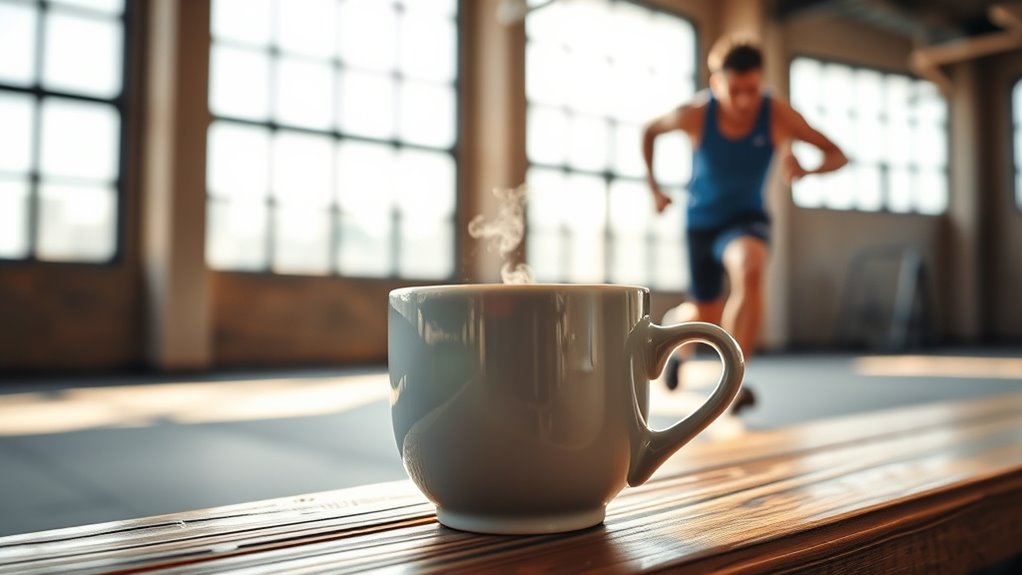
Caffeine is a powerful ally when it comes to enhancing exercise performance. By consuming effective doses of caffeine—typically between 3 to 6 mg per kilogram of body weight—you can experience improved muscular endurance and strength.
Taking caffeine about 45 to 60 minutes pre-workout not only boosts your physical capabilities but also sharpens cognitive function, making your sessions feel less intense. Research shows that caffeine can reduce perceived exertion by approximately 5.6%, allowing you to push harder and longer during your workouts.
Whether you’re engaged in anaerobic or aerobic activities, caffeine can enhance your overall performance by 2 to 5 percent, helping you reach peak performance levels and making each workout more productive.
How Caffeine Works in the Body
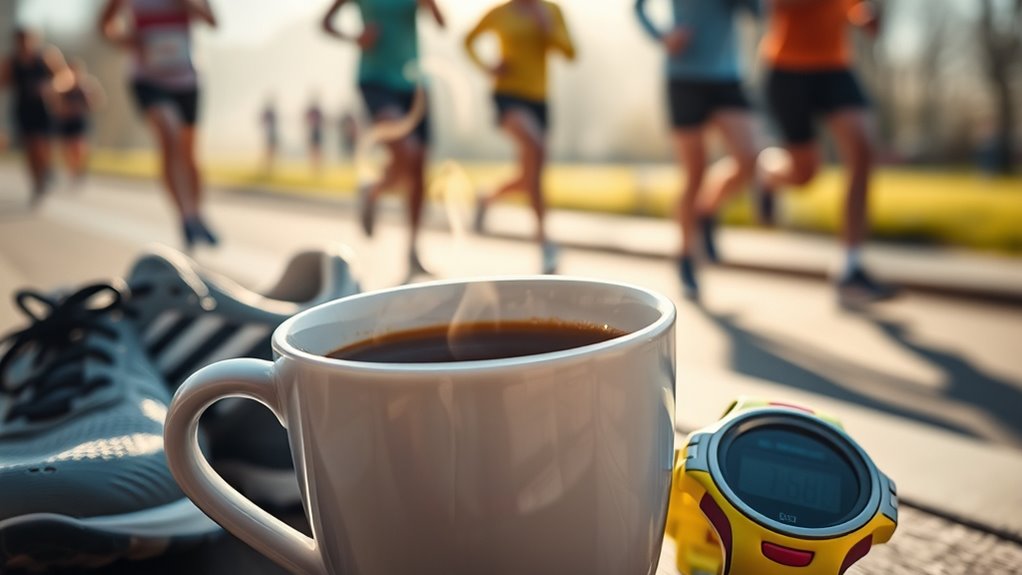
When you consume caffeine, it starts working by blocking adenosine receptors in your brain. This action prevents drowsiness and boosts your alertness.
Caffeine boosts alertness by blocking adenosine receptors in the brain, effectively preventing drowsiness.
Here’s how caffeine enhances your exercise performance:
- Increased Energy: By stimulating the central nervous system, caffeine helps you feel more energized during workouts.
- Enhanced Mood: It triggers the release of neurotransmitters like dopamine, improving focus and overall cognitive function.
- Muscular Strength: Caffeine increases calcium ion mobilization, leading to better interaction with muscle fibers, enhancing muscular strength.
- Optimal Timing: Its effects can peak within 30 to 120 minutes, and with a half-life of 4 to 6 hours, timing your caffeine intake can maximize its performance benefits in the body.
Optimal Timing and Dosage for Caffeine Consumption
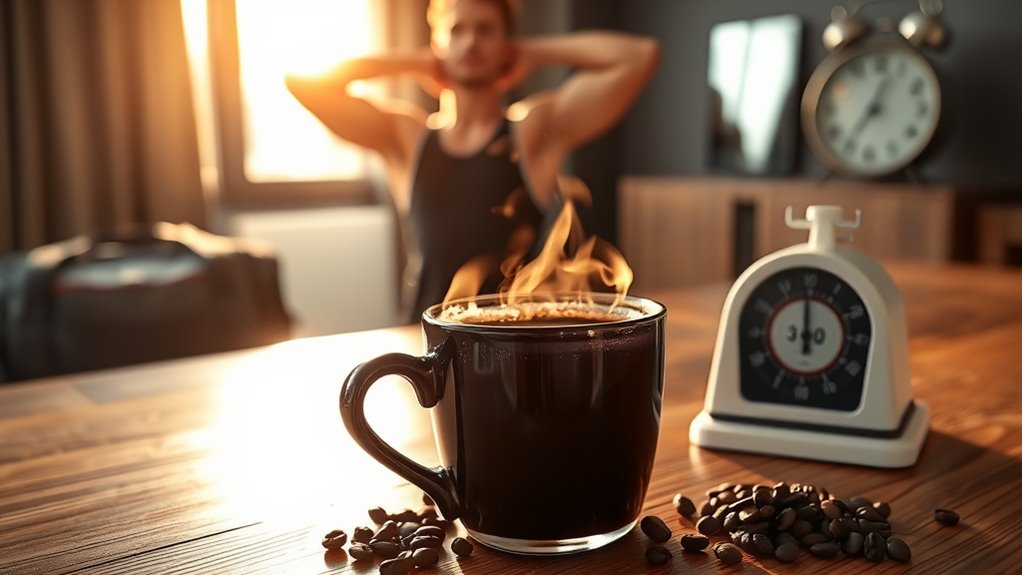
To maximize the benefits of caffeine for exercise performance, timing and dosage play essential roles. Aim to consume caffeine 45-60 minutes before your workout to reach peak effectiveness.
For ideal timing, wait at least 30 minutes after caffeine consumption before starting your exercise routine, as this allows the effects to kick in.
The recommended dosage for performance enhancement is between 3-6 mg per kg of body weight. For a 150-pound individual, this translates to about 135-405 mg, which you can typically get from 1-2 cups of coffee.
This careful approach to caffeine consumption can considerably boost workout efficacy and provide notable performance benefits, helping you achieve your fitness goals more effectively.
Different Sources of Caffeine

Here are four common sources you might consider:
- Coffee: An average cup packs about 100 mg of caffeine, boosting your endurance performance effectively. Additionally, studies show that creativity and inspiration can be enhanced with moderate caffeine consumption. Regular caffeine intake has also been linked to improved physical and mental health, making it a valuable addition to your pre-exercise routine. Furthermore, herbal tea can be a beneficial alternative for hydration and relaxation after workouts. Moreover, incorporating caffeine into your routine can lead to increased customer satisfaction in fitness app usage, as users appreciate enhanced performance.
- Energy Drinks: These can contain between 80 to 300 mg of caffeine per serving, offering a quick energy boost for athletic activities.
- Caffeine Gum: This provides rapid absorption, reaching peak effectiveness faster than traditional beverages.
- Chocolate: While lower in caffeine (1-15 mg), it can still contribute to your overall caffeine dose when consumed. Additionally, drinking coffee can enhance your performance by improving color accuracy in your perception of physical effort.
The Placebo Effect and Caffeine
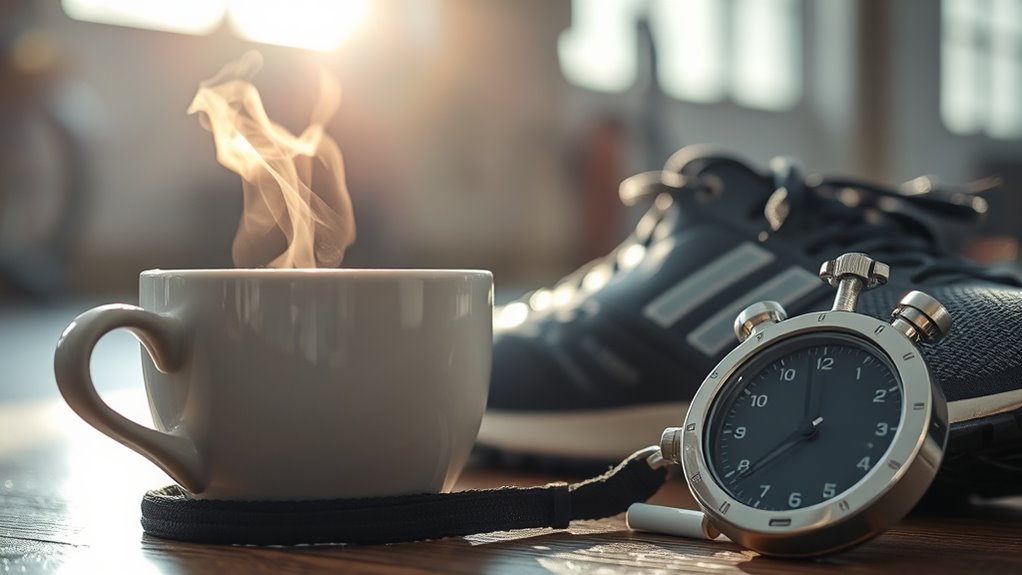
When you think about caffeine’s effects, your expectations can actually boost your performance.
Studies show that just believing you’ve consumed caffeine can make workouts feel easier and improve your results.
This psychological influence highlights how individual responses can vary, making it essential to understand your own connection to caffeine and its potential placebo effects.
Expectation Enhancing Performance
Although caffeine’s physical effects on exercise performance are well-documented, the psychological impact of expectation can be just as significant.
When you anticipate caffeine’s benefits, it can lead to a notable performance enhancement. Here’s how expectation plays a role:
- Placebo Effect: Believing in caffeine’s power boosts your performance.
- Perceived Exertion: Expectation can reduce your sense of effort, making exercise feel easier.
- Anticipation: The simple act of looking forward to caffeine can enhance your drive.
- Individual Responses: Your unique genetic makeup influences how much the placebo effect impacts you.
Psychological Influence of Caffeine
Caffeine doesn’t just boost your physical capabilities; it also taps into the power of your mind. The placebo effect plays a notable role in this psychological impact.
When you expect caffeine to enhance your performance, your brain can trick your body into feeling less exertion, leading to a 5.6% reduction in perceived effort during exercise. This anticipation often translates into better athletic performance, regardless of whether you’ve actually consumed caffeine.
In fact, studies show that believing you’ve ingested caffeine can improve your output. Combining real caffeine intake with positive expectations can result in an impressive 11% performance boost.
Individual Variability in Responses
While many athletes rely on caffeine to enhance their performance, individual responses can differ widely based on genetic factors and personal habits. Here’s what you should know about these variations:
- Genetics Matter: Some people metabolize caffeine faster, affecting its ergogenic effects.
- Placebo Power: Your expectation of caffeine’s performance-enhancing effects can improve outcomes, even without actual caffeine.
- Habitual Users: If you regularly consume caffeine, you might experience a diminished placebo effect compared to non-users.
- Cognitive Boost: Caffeine can enhance cognitive function, attention, and mood, highlighting the psychological factors influencing exercise performance.
Understanding these individual responses can help you optimize your caffeine strategy for better results in your workouts.
Potential Side Effects of Caffeine
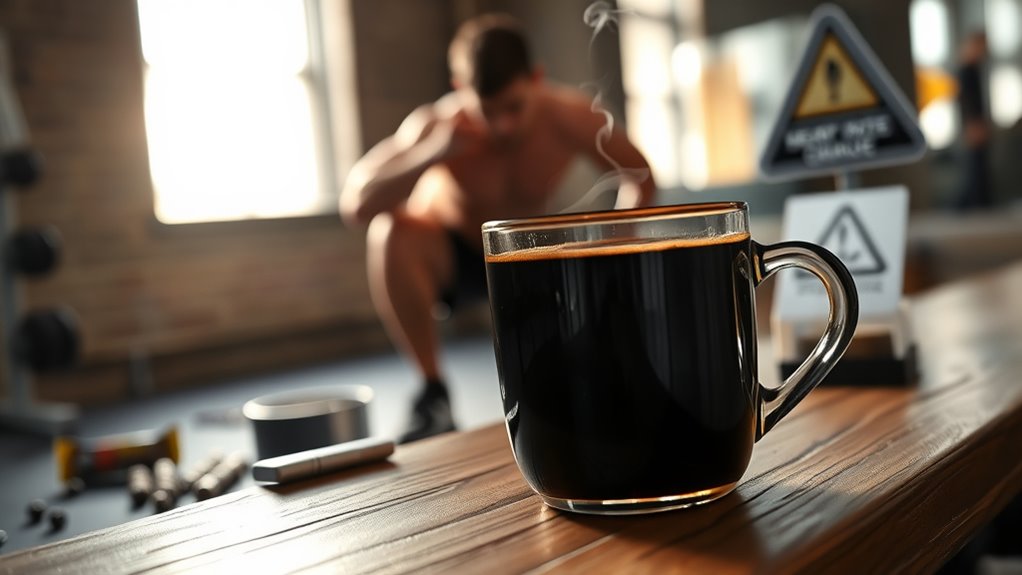
While caffeine can boost your workout, it’s important to be aware of potential side effects.
You might experience nervousness, anxiety, or even digestive issues, especially if you take it on an empty stomach.
Plus, late-day consumption could disrupt your sleep, countering any performance benefits you gain.
Nervousness and Anxiety
Although many people rely on caffeine to boost their energy levels, it can sometimes lead to increased nervousness and anxiety, especially for those sensitive to stimulants or consuming high doses.
Here are some side effects you might experience:
- Jitters: Excess caffeine can cause shaky hands and restlessness.
- Increased Heart Rate: Caffeine can elevate your heart rate, which may heighten feelings of anxiety.
- Decreased Exercise Performance: Anxiety might negatively impact your ability to perform tasks requiring fine motor skills.
- Individual Response: Everyone has different tolerance levels; some may feel anxious even with moderate caffeine.
Monitoring your individual response to caffeine is essential to avoid these adverse effects and maintain peak exercise performance.
Sleep Disruption Risks
Caffeine can greatly disrupt your sleep patterns, making it challenging to fall asleep and leading to poorer sleep quality.
If you consume caffeine late in the day, its lingering effects—due to its average half-life of 4 to 6 hours—can greatly impact your ability to rest.
Individuals sensitive to caffeine may find themselves feeling anxious or restless, further hindering relaxation.
Chronic sleep disruption can negate any performance gains you’d typically achieve from caffeine, ultimately diminishing your exercise performance.
To maximize its benefits, aim to consume caffeine at least 8 to 12 hours before bedtime.
Prioritizing your sleep quality is essential for ideal athletic performance and overall well-being.
Digestive Issues During Exercise
When you hit the gym or the track, the last thing you want is an upset stomach. Caffeine can boost your performance, but it also carries the risk of digestive issues. Here are some potential problems to watch out for:
- Stomach upset: Consuming coffee, especially on an empty stomach, may lead to cramping or discomfort.
- Gastrointestinal discomfort: Blood flow shifts from your digestive system to your muscles, affecting digestion.
- Increased anxiety: Sensitive individuals might experience jitteriness, further complicating their workout.
- Diarrhea: Excessive caffeine doses can exacerbate digestive issues, so moderation is key.
To prevent discomfort, consider experimenting with lower doses or skipping caffeine before exercise.
Understanding Caffeine Tolerance
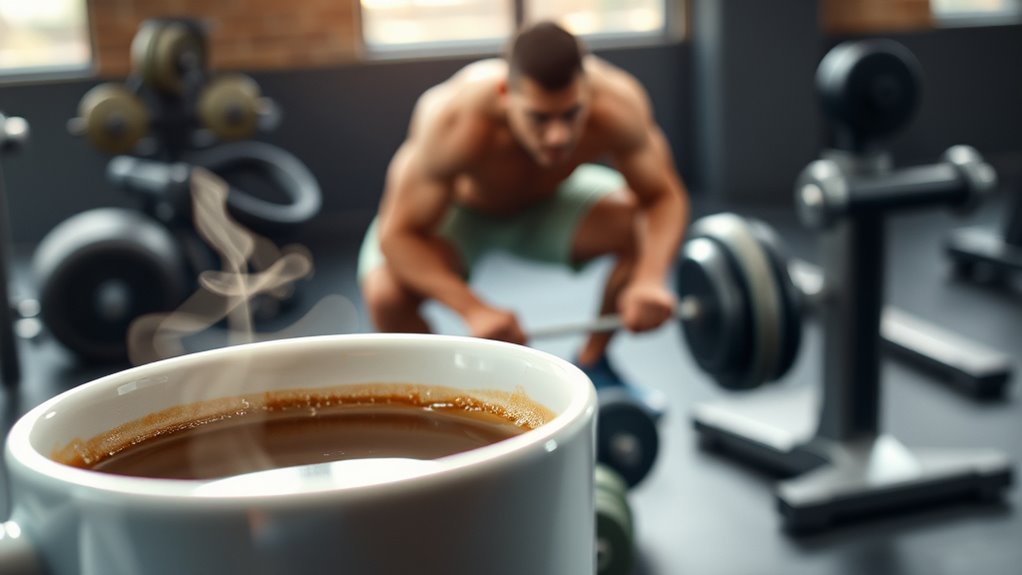
As you explore the effects of caffeine on exercise performance, it’s important to understand how tolerance can influence your experience.
Caffeine tolerance develops with habitual use, yet it usually doesn’t diminish the performance-enhancing effects for most individuals. Individual variability in caffeine metabolism, driven by genetic factors, can affect your tolerance levels and response.
To maximize benefits, you’ll want to determine your ideal dosage, typically ranging from 3 to 6 mg/kg of body weight. Personal experimentation can help you find the best timing and dosage for your workouts.
Additionally, taking a break from caffeine might enhance the placebo effect, making reintroducing it even more effective. Understanding these elements can help you tailor your caffeine intake for peak performance.
Individual Responses to Caffeine

When it comes to caffeine, your response can be uniquely yours due to genetic factors and how your body metabolizes it.
Some might feel a noticeable boost in performance, while others may hardly notice any change.
Additionally, your tolerance, sensitivity levels, and even the timing and dosage of caffeine can greatly influence its effects on your workouts.
Genetic Variability in Response
Caffeine can considerably impact exercise performance, but how you respond to it largely depends on your genetics. Genetic factors, especially variations in the CYP1A2 gene, play an important role in how effectively you metabolize caffeine.
Here are some key points to keep in mind:
- About 30-50% of you might be “slow metabolizers,” experiencing prolonged effects and potential side effects.
- Variations in serotonin receptor activity can change your experience of caffeine’s ergogenic effects.
- You may find that lower doses enhance your performance, while others may need more.
- Your genetic predisposition can also affect caffeine’s impact on cognitive function and perceived exertion during workouts.
Personal experimentation is essential to discover what works best for you!
Tolerance and Sensitivity Levels
While many athletes rely on caffeine to boost their performance, individual tolerance and sensitivity levels can greatly influence the effects you experience. Genetic factors, like variations in the CYP1A2 enzyme, determine your caffeine sensitivity and metabolism, leading to different individual responses.
Some folks may feel jittery and anxious, while others enjoy heightened focus. Curiously, habitual use mightn’t diminish the performance-enhancing effects of caffeine, allowing regular consumers to maintain benefits.
Experimenting with various dosages—between 1.4 to 2.7 mg per pound of body mass—can help you find your best caffeine intake. Additionally, abstaining from caffeine before an event could trigger a stronger placebo effect, enhancing your exercise performance when you finally do consume it.
Timing and Dosage Effects
Finding the right timing and dosage for caffeine can greatly enhance your exercise performance. To maximize its benefits, consider these key points:
- Caffeine Dosage: Aim for 3-6 mg/kg of body weight, with some individuals benefiting from as low as 2 mg/kg.
- Timing: Consume caffeine about 45-60 minutes before your workout for ideal effects, as it peaks during this window.
- Individual Responses: Everyone reacts differently to caffeine due to genetics, sex, and habitual consumption, so personal experimentation is essential.
- Duration of Effects: Caffeine’s half-life is 4-6 hours, influenced by factors like pregnancy and smoking, affecting how long those performance-enhancing effects last.
Caffeine and Cognitive Function
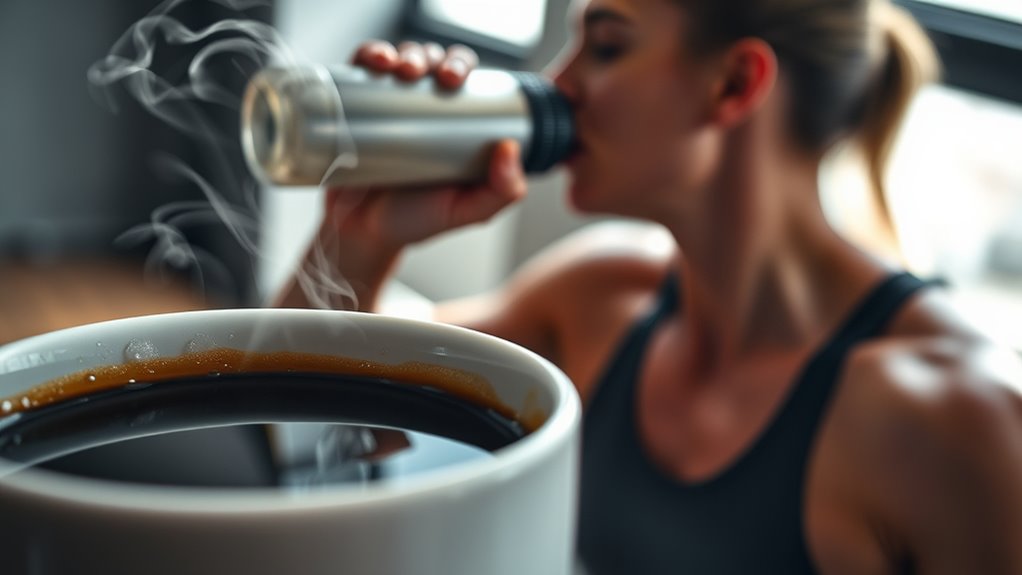
When you consume caffeine, it considerably boosts your cognitive function by enhancing alertness, attention, and focus. This improvement can directly influence your exercise performance, making workouts feel more manageable.
Research shows that caffeine reduces perceived exertion, so you might find that your efforts feel less intense, allowing you to push through longer sessions. Additionally, caffeine enhances vigilance and reaction times, which are especially beneficial in sports that require quick decision-making.
You’ll also notice a boost in mood and motivation due to caffeine’s ability to stimulate dopamine release. Even if you’re sleep-deprived, caffeine helps maintain your cognitive performance, ensuring that you can perform effectively, regardless of fatigue. Furthermore, caffeine can lead to improved athletic performance, allowing you to maximize your workout potential.
Embracing caffeine could be a game-changer for your workouts!
Tips for Incorporating Caffeine Into Your Workout Routine
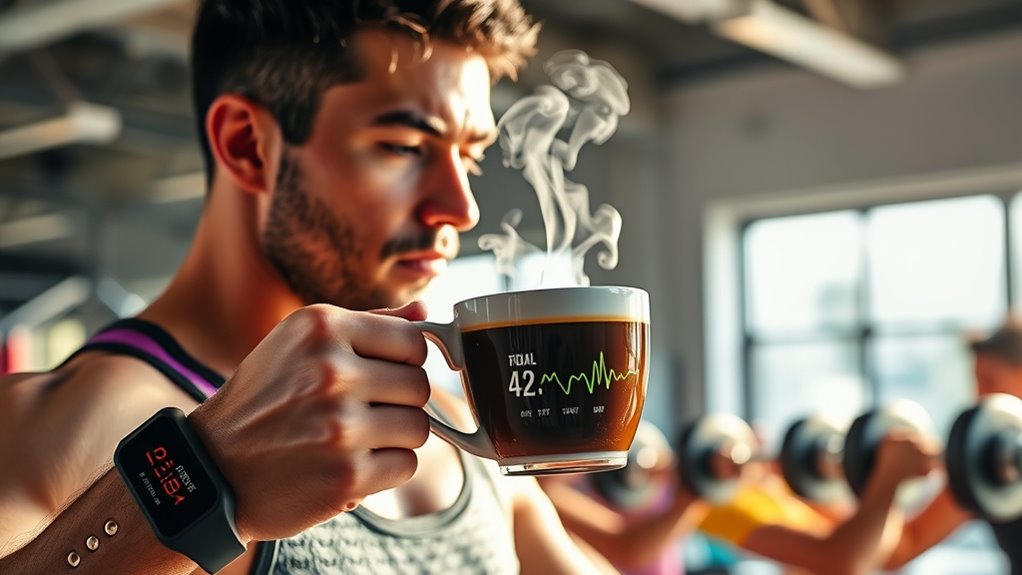
Incorporating caffeine into your workout routine can greatly enhance your performance, especially if you time it right. Here are some tips to get started:
- Timing is Key: Drink coffee 45–60 minutes before your workout for peak effectiveness.
- Know Your Dosage: Aim for 3–6 mg of caffeine per kg of body weight. For a 150-pound person, that’s about 135–405 mg, or 1-2 cups of coffee.
- Experiment with Forms: Try brewed coffee, espresso, or energy gels to see which suits you best.
- Monitor Your Body: Pay attention to individual sensitivities and adjust your intake to avoid jitters or digestive issues.
Additionally, be mindful of your sleep schedule, avoiding caffeine 8–12 hours before bedtime. Consuming caffeine can also lead to increased caffeine content in your performance, making it a popular choice among athletes.
Frequently Asked Questions
Does Coffee Improve Exercise Performance?
Yes, coffee can improve your exercise performance. When you drink it before a workout, caffeine boosts your muscular endurance, strength, and aerobic capacity.
You’ll likely notice a 2 to 5 percent improvement in various activities. To maximize benefits, aim for 3 to 6 mg of caffeine per kilogram of your body weight, and sip your coffee about 30 to 60 minutes before exercising for peak effectiveness.
It’ll also sharpen your focus during your workouts.
Is Coffee Good for You if You Workout?
If you work out, coffee can be a beneficial addition to your routine. It boosts your energy levels and alertness, helping you push through tough workouts.
You’ll find that consuming coffee about 45–60 minutes before exercising may enhance your performance.
Just be mindful of how much you drink, as too much caffeine can lead to side effects like anxiety or disrupted sleep.
Is It Better to Drink Coffee Before or After a Workout?
Some might think drinking coffee after a workout is just as beneficial, but that’s not quite the case.
You’ll get the most out of your coffee by consuming it about 45-60 minutes before exercising. This timing helps boost your energy and endurance when you need it most.
While coffee can aid recovery post-workout, it’s the pre-exercise boost that really enhances your performance.
Is It Better to Workout With or Without Caffeine?
When deciding whether to work out with or without caffeine, consider your personal tolerance and goals.
Caffeine can boost your energy and endurance, helping you push through tough workouts. However, if you’re sensitive to its effects, it might lead to anxiety or disrupted sleep.
Experiment with your routine to see what feels best for you. Ultimately, it’s about finding the right balance that enhances your performance without causing negative side effects.
Conclusion
Incorporating caffeine into your workout routine can be a game-changer, boosting both performance and focus. It’s fascinating how a simple cup of coffee can turn an ordinary session into an extraordinary one, just when you need that extra push. Remember, though, everyone responds differently, so experiment to find your sweet spot. Whether it’s a morning brew or an afternoon pick-me-up, you’ll likely discover that caffeine not only fuels your body but also sharpens your mind for peak performance.









